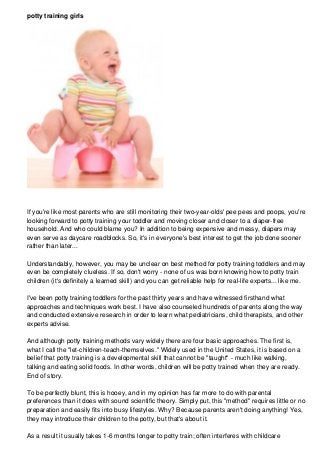
potty training
- 1. potty training girls If you're like most parents who are still monitoring their two-year-olds' pee pees and poops, you're looking forward to potty training your toddler and moving closer and closer to a diaper-free household. And who could blame you? In addition to being expensive and messy, diapers may even serve as daycare roadblocks. So, it's in everyone's best interest to get the job done sooner rather than later... Understandably, however, you may be unclear on best method for potty training toddlers and may even be completely clueless. If so, don't worry - none of us was born knowing how to potty train children (it's definitely a learned skill) and you can get reliable help for real-life experts... like me. I've been potty training toddlers for the past thirty years and have witnessed firsthand what approaches and techniques work best. I have also counseled hundreds of parents along the way and conducted extensive research in order to learn what pediatricians, child therapists, and other experts advise. And although potty training methods vary widely there are four basic approaches. The first is, what I call the "let-children-teach-themselves." Widely used in the United States, it is based on a belief that potty training is a developmental skill that cannot be "taught" - much like walking, talking and eating solid foods. In other words, children will be potty trained when they are ready. End of story. To be perfectly blunt, this is hooey, and in my opinion has far more to do with parental preferences than it does with sound scientific theory. Simply put, this "method" requires little or no preparation and easily fits into busy lifestyles. Why? Because parents aren't doing anything! Yes, they may introduce their children to the potty, but that's about it. As a result it usually takes 1-6 months longer to potty train; often interferes with childcare
- 2. opportunities because these toddlers are that much older when they're trained; diapers are needed longer, so parents waste money; and it's more difficult to potty train these toddlers because their behaviors are more entrenched. The second method for potty training toddlers is one that is not commonly used in the United States and practiced mostly in developing nations. I call it the "potty-train-babies" approach. Parents using this process, hold their infants over the potty to catch their eliminations. It's based on the theory that babies will gradually learn to signal before they urinate or have bowel movements. And while there is scientific evidence that supports this theory and it certainly puts an early end to diapers, it is extremely impractical for most families. Why? Because it requires an extreme level of attention and commitment from parents, grandparents, babysitters, and anyone else who comes in contact with the babies. Also, as you might expect accidents are commonplace so time and energy spent cleaning up can be onerous. In other words, this is definitely not potty training made easy! The third basic approach is the "practice-makes-perfect" method; over time parents introduce their children to the potty and conduct regular teaching sessions with them. The system is based on the belief is that toddlers will eventually "get it" and transition from diapers to pull-ups to underwear. Again, in my opinion, this method sets parents - and children - up for failure for three major reasons: 1. The vast majority of parents cannot remain consistent over the extended period of time this requires (i.e. practice sessions must be frequent and regular in order for this to work). Also, you should be aware that this is a slow and circuitous road to a diaper-free world, so be prepared to hunker down for the long haul if go this route. 2. Using pull-ups and/or diapers during the training process sends complicated mixed messages to toddlers and severely hampers the potty training process 3. Children are learning to use the potty at their parents' initiation, not their own! That's not the objective here... the goal is to potty train toddlers, not parents! The fourth basic method for potty training toddlers is the accelerated approach. Although there are many different techniques used within this fundamental mode - some good, others not - I do recommend this method. Here is a quick overview of an accelerated method which combines time-tested, wholesome behavioral modification techniques within a positive, nurturing and emotionally supportive environment. o Before potty training toddlers parents assess their developmental and chronological readiness o One parent (or teacher) commits to potty training process for 24-48 hours and sets up a one-on- one teaching environment and prepares carefully in advance. o The potty training teacher follows specific step-by-step instructions, which are designed to accelerate the potty-training process
- 3. o Potty training is accomplished in much less time than traditional methods and provides a wonderful bonding experience for parents and their children. In the end, however, how you potty train your child will be a personal decision based on your lifestyle and preferences, and regardless of which method you choose, it's important to keep the following in mind... 1. Toddlers have a profound and earnest wish to grow and master new skills, even though they may act as stubborn as mules! Children want to be potty trained, even if they don't show it! 2. Normal, healthy toddlers between the ages of 18 and 27 months should be physically and developmentally ready for potty training. If you have any concerns regarding your child's readiness, check with his/her pediatrician. 3. Parents who have a well-thought-out and workable plan - and execute it properly (this is a big one) - are far more successful (i.e. their children are potty trained faster, less stressfully, and more completely) than those who do not. Period. potty training tips Learn More by Visiting https://www.youtube.com/channel/UCANQtth9yg32J1ALWOc8KlQ